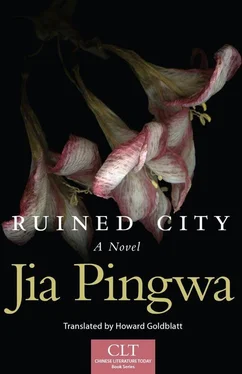“Is that so?” Zhuang said as he boiled some water for tea. “Let them change the verdict. I don’t care. We lose if they say we lost, and we lose even if they say we won. Have some water.”
Declining the water, Zhou said anxiously, “So we’ll just sit around and let them do this to us? One of the rulings required the judgment to be publicized in the papers.”
Zhuang sat down; the scroll on the wall behind the sofa was gone, replaced by a cowhide. “So? Let them. You can go see the chief judge of the Superior Court if you want to, but count me out. I refuse to ask anyone for help again.”
“What’s the use of my going to see him, Zhuang Laoshi?” Zhou was about to cry. “Please go see him, I beg you. We’ve fought so hard for so long only to end up like this?”
“What can I say to you, Zhou Min? Would you let me off the hook and stop talking about this? I’m writing a novel. I’m a writer, and I need peace and quiet to write.”
“All right, then. I won’t beg you anymore, Zhuang Laoshi. Go write your book and be the celebrity you want to be. I’ve been ruined by your name, but I deserve it.” Zhou walked out and slammed the door behind him.
The Provincial Superior Court issued its final verdict seven days later, which was published in every newspaper in the city on the same day. For several nights, Zhou Min followed Jing Xueyin home after she left work in order to find out where she lived. Finally, on a rainy night, he hid at a street corner until Jing’s husband came out on his bike. Zhou pounced like a wolf, knocking him down. “Why won’t you pay back the money you owe my friend, Liu Sanguai?”
With his raincoat over his head, Jing’s husband replied, “You’ve got the wrong man, buddy. I’m not Liu Sanguai, and I don’t owe anyone any money.”
Secretly pleased, Zhou went on with his demand. “Are you a man or not? Why won’t you admit the debt? You’re a prick is what you are. Don’t blame me for getting rough. I’m just doing what I’m paid to do. Since you don’t want to pay back the money you owe, you’ll have to use that money to see a doctor.” Zhou lifted his foot and stomped on the man’s skinny calf; a loud crack told him he had broken a bone, so he got on his bike and sped off.
A drunken Zhou Min showed up at the magazine office the following morning, where everyone was talking about how Jing Xueyin’s husband had been sent to the hospital with a broken leg. They were all saying that he got what he deserved, adding that the six hundred yuan the court had ordered as compensation for the defamation wouldn’t be enough to pay his medical bills.
“Who did it?” Zhou Min said. “We ought to find the man and shake his hand. How did it happen?”
“They say it was a case of mistaken identity,” Li Hongwen said. “Hmm, who would do that without checking his identity? He must have done something wrong to deserve that. If you can manage it, Zhou Min, why don’t you take something to him at the hospital? The magazine will pay for it, of course.”
“I’d go if I were still working here, but I’m no longer an employee of the magazine.”
“Did they fire you?”
“They would have sooner or later, so I decided to quit first.” Zhou took a carton of cigarettes out of his bag and handed everyone a pack. “I want to thank you all for watching out for me over the past few months. I’m sorry I brought the magazine so much trouble. I’m leaving now, and I ask that you forget me after you finish the cigarettes. I’m like the ash that dissipates when you blow on it.”
The others could only stare blankly until Li spoke up. “But Zhou Min, we can’t finish them completely, since there’s always the butt. Which means we will never forget you.”
“Then spit the butt into the trash can by the wall,” Zhou said with a smile. He headed to the door, giving them a casual wave before he walked out.
All of Xijing was abuzz after the news appeared in the newspaper. Those who hadn’t known about the lawsuit searched for the issue of Xijing Magazine carrying Zhou Min’s article, prompting Li Hongwen to secretly sell the remaining copies at a high price to a wholesaler, who raised the price and sold them to street vendors. In the meantime, the tabloids sent reporters to interview the magazine employees and Jing Xueyin, increasing their circulation with a flurry of stories. Gossip flew with every new version. Zhuang’s door was knocked on at least ten times a day, but he never opened it; his phone rang constantly, with the callers wanting to ask him about the case, to offer consolation or share their indignation, even to revile him. In the end, he unplugged the phone. When he couldn’t stay holed up at home any longer, he donned a pair of dark glasses and walked outside, planning either to play mahjong at Meng’s house, to go ask Zhao Jingwu or Hong Jiang for some money, or to visit Ah-lan at the mental hospital. But when he reached the intersection, he was seized by indecision. A bicycle came toward him, so he moved to the left just as the cyclist pedaled to the same side, and the same thing happened when he shifted to the right. The man cried “Aha” as they both hit the ground along with the bike. When Zhuang got to his feet, he saw that people were looking at him and laughing, so he hurried off; the cyclist rode by and cursed him, “Are you blind?”
Zhuang froze on the spot, at which point the man turned back and rode past him slowly. “Zhuang Zhidie?” he said. Zhuang didn’t know the man, whose face was covered in zits. “Looks like him, but no, it’s not Zhuang Zhidie.” Finally he rode off. Zhuang was glad the man didn’t recognize him; otherwise it would have been awkward. He continued walking aimlessly, telling himself that he wouldn’t have confirmed his identity even if the man had known who he was. He laughed silently at the thought, and then spotted a tiny yellow banner flapping under a willow tree down a lane. “Liquor” was written on the banner, so he walked over and saw that it was a small tavern. He went in and ordered a drink. After downing a cup, he recalled that he had been there before — on the day he saw the funeral with filial sons and grandsons and heard the slow but beautiful funeral music. Feeling a sense of affinity with the tavern, he decided not to play mahjong with Meng or to go see Zhao and Hong. He fished another bill out of one of his shoes to buy a second cup, which he silently nursed until the sunshine glided off the table. With a casual turn of his head, he saw someone who looked like Liu Yue hurrying by. He called out to her, but she didn’t respond, so he leaned against the door to look that way. It was Liu Yue. He called her name again, taking in a mouthful of wind, and took off after her. After about ten meters, he fell to the ground and threw up.
Thinking she heard someone call her name, Liu Yue slowed down, but she quickened her steps again when she didn’t hear anything more. I must have heard wrong , she told herself, but something kept nagging at her, so she turned and saw a man fall to the ground; curious, she walked back to the spot and cried out, “Zhuang Laoshi! Are you drunk?” She tried but failed to help him up, so she ran out to the street to hail a taxi. Every taxi that drove by was taken. By the time she managed to get one and talk the driver into helping her get him into the car, a dog was already there, licking the former contents of Zhuang’s stomach. It was even licking his face. He was too weak to drive the dog away and could only wave weakly. “Get the dog,” he said. “The dog.” Liu Yue sent it off with a kick before getting Zhuang into the taxi with the driver’s help. They tore down the street and arrived at the compound, where she helped him inside to wash his face and rinse his mouth.
Читать дальше


![Matthew Vincent - [you] Ruined It for Everyone!](/books/216429/matthew-vincent-you-ruined-it-for-everyone-thumb.webp)









